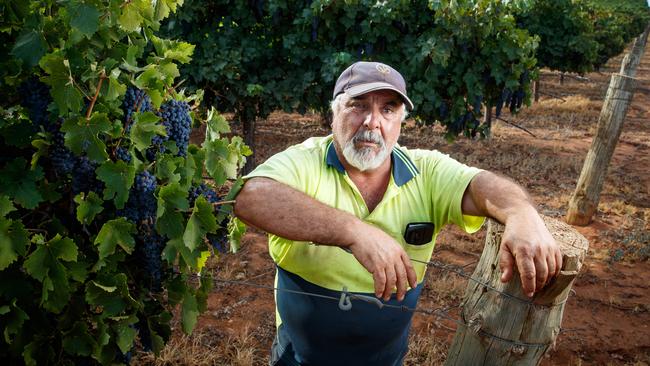Wine industry seeks $86m rescue package after China trade war pain
China trade war-hit Australian grape growers and wineries are seeking an $86m federal assistance package to help growers shift to new crops or exit the industry altogether.

Embattled Australian grape growers and wineries are seeking an $86m federal assistance package to help growers shift to new crops or exit the industry altogether as it reels from the $1.2bn hit from the China trade war.
The package would do three things: restore balance to supply by addressing the glut of grapes, help the wine industry diversify into new export markets beyond China, and drive domestic tourism to grape-growing regions to inject much-needed revenue into struggling communities.
The four-year impact of Beijing’s punishing tariffs has been the nail in the coffin for many growers already suffering a collapse in prices caused by oversupply and reduced demand.
Many growers in Australia’s three biggest regions in the Riverland, Riverina and Sunraysia are running their business at unsustainable losses, with grape prices plunging from a high of $700 to just $150 a tonne earlier this year.

The Weekend Australian travelled to the Riverland in February and met several growers including Jim Giaghias, who said many could see no future in grapes and wanted to exit the industry.
The nation’s peak wine body, Australian Grape and Wine, wrote this week to Treasurer Jim Chalmers outlining a pre-budget submission to save the industry, co-signed by some of the biggest players, including Treasury Wine Estates, Taylors, Angove, De Bortoli, Casella, Hill-Smith Family Estates, Calabria, Pernod-Ricard Winemakers and Berton Vineyards.
Australian Grape and Wine CEO Lee McLean said the industry was not seeking a bailout but wanted recognition that the biggest driver of its economic problems had been a trade war “completely beyond our control”.

He said if the federal government failed to get involved and help the industry it would face a bigger bill as entire towns risked having the backbone of their local economies destroyed.
“It has been really hard and I have repeatedly visited a lot of these communities and it is not getting any better, that’s for sure,” he told The Weekend Australian.
“If we don’t make a relatively modest investment to help the industry now, we could face bigger problems down the track with a mass exodus from these towns, high rates of unemployment, pressure on schools.
“We are making the case for intervention because this is not a normal market fluctuation we have seen. The impact of the loss of the China market has had a sudden and profound impact. There are millions of litres of wine just sitting in tanks. It has been a devastating economic shock to our industry that was completely beyond our control.”
Mr McLean said one of the most important parts of the package was $30m for supply-side adjustments to help growers cover the cost of pulling their grapes and either growing new crops or leaving the industry altogether.
“We know there are a lot of growers that are looking to transition out completely but simply don’t have the means to do it,” he said. “We need to remove that barrier to exit so that people can leave in a sustainable and environmentally friendly way, but also with the dignity of having a little cash in their pocket.”
The submission also seeks $36m from the commonwealth to find and grow new export markets, warning the industry does not believe the resumption of trade with China will return to the $1.2bn level prior to the imposition of tariffs in March 2020.

The letter to Dr Chalmers warns that without assistance many in Australia’s $45bn wine industry will not survive, jeopardising the 160,000 people the industry employs, mostly in regional Australia.
“There are well over 1500 inland growers in the Riverland, Riverina and Murray-Darling regions that are suffering with no end in sight,” the letter warns.
Treasury Wine Estates CEO Tim Ford said the budget submission was a chance for Australia to “refocus the centre of gravity of the industry towards higher quality”.
“People are drinking less but they are drinking higher-value or higher-priced wine,” he said.
“You can say ‘let market forces be market forces’, but when you combine that with China, it requires a structural adjustment.”







To join the conversation, please log in. Don't have an account? Register
Join the conversation, you are commenting as Logout